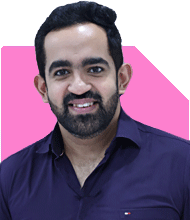Ramalingam Kalirajan |8093 Answers |Ask -Follow
Mutual Funds, Financial Planning Expert - Answered on May 15, 2024
He has an MBA in finance from the University of Madras and is a certified financial planner.
He is the director and chief financial planner at Holistic Investment, a Chennai-based firm that offers financial planning and wealth management advice.... more

I am 68 year, getting pension 60000 /month with CGHS facilities. I invested Rs 3000000 as FDs in Small Finance bank @ 9% interest and 3500000 in SCSS and PMVVY scheme. I have no other liabilities at present. Kindly suggest / guide me for investment please.
Current Investment Assessment
Your current investments in Fixed Deposits (FDs), Senior Citizen Savings Scheme (SCSS), and Pradhan Mantri Vaya Vandana Yojana (PMVVY) offer stable returns and capital preservation, which is suitable for retirees seeking income stability and safety.
Diversification Opportunity
While FDs, SCSS, and PMVVY provide security, considering diversification into other asset classes can enhance your overall portfolio growth potential. Exploring options like mutual funds, bonds, and dividend-paying stocks can offer higher returns while maintaining a balanced risk profile.
Tax Efficiency
Optimizing tax efficiency is crucial to maximize your post-tax returns. Investing in tax-efficient instruments like Tax-Free Bonds, Equity Linked Savings Schemes (ELSS), and tax-saving mutual funds can help minimize tax liabilities while generating attractive returns.
Portfolio Rebalancing
Regularly reviewing and rebalancing your investment portfolio ensures alignment with your financial goals and risk tolerance. Assessing the performance of your existing investments and reallocating funds based on changing market conditions and personal circumstances can optimize returns and mitigate risk.
Consultation with a Financial Advisor
Seeking guidance from a qualified financial advisor can provide personalized investment recommendations tailored to your specific needs and objectives. They can help assess your risk tolerance, suggest suitable investment strategies, and monitor your portfolio's performance to ensure it aligns with your long-term goals.
Contingency Planning
While focusing on investments, it's essential to prioritize contingency planning. Maintaining an emergency fund equivalent to 6-12 months' worth of expenses ensures financial security during unexpected events or emergencies.
Conclusion
Your prudent approach towards investment and financial planning is commendable. By diversifying your portfolio, optimizing tax efficiency, and regularly reviewing your investments with the guidance of a financial advisor, you can further enhance your financial well-being and enjoy a worry-free retirement.
Best Regards,
K. Ramalingam, MBA, CFP,
Chief Financial Planner,
www.holisticinvestment.in
You may like to see similar questions and answers below
Sunil Lala | Answer |Ask -Follow
Financial Planner - Answered on Feb 11, 2024
Ramalingam Kalirajan |8093 Answers |Ask -Follow
Mutual Funds, Financial Planning Expert - Answered on Jun 03, 2024
Ramalingam Kalirajan |8093 Answers |Ask -Follow
Mutual Funds, Financial Planning Expert - Answered on Jun 09, 2024
Inderpaul Singh |47 Answers |Ask -Follow
Leadership Coach - Answered on Mar 12, 2025
T S Khurana |398 Answers |Ask -Follow
Tax Expert - Answered on Mar 12, 2025
T S Khurana |398 Answers |Ask -Follow
Tax Expert - Answered on Mar 12, 2025
Rajesh Kumar Singh |192 Answers |Ask -Follow
IIT-JEE, GATE Expert - Answered on Mar 12, 2025
T S Khurana |398 Answers |Ask -Follow
Tax Expert - Answered on Mar 12, 2025
Aamish Dhingra |14 Answers |Ask -Follow
Life Coach - Answered on Mar 12, 2025
Kanchan Rai |554 Answers |Ask -Follow
Relationships Expert, Mind Coach - Answered on Mar 12, 2025
Kanchan Rai |554 Answers |Ask -Follow
Relationships Expert, Mind Coach - Answered on Mar 12, 2025
Prof Suvasish Mukhopadhyay |499 Answers |Ask -Follow
Career Counsellor - Answered on Mar 12, 2025
Prof Suvasish Mukhopadhyay |499 Answers |Ask -Follow
Career Counsellor - Answered on Mar 12, 2025

























